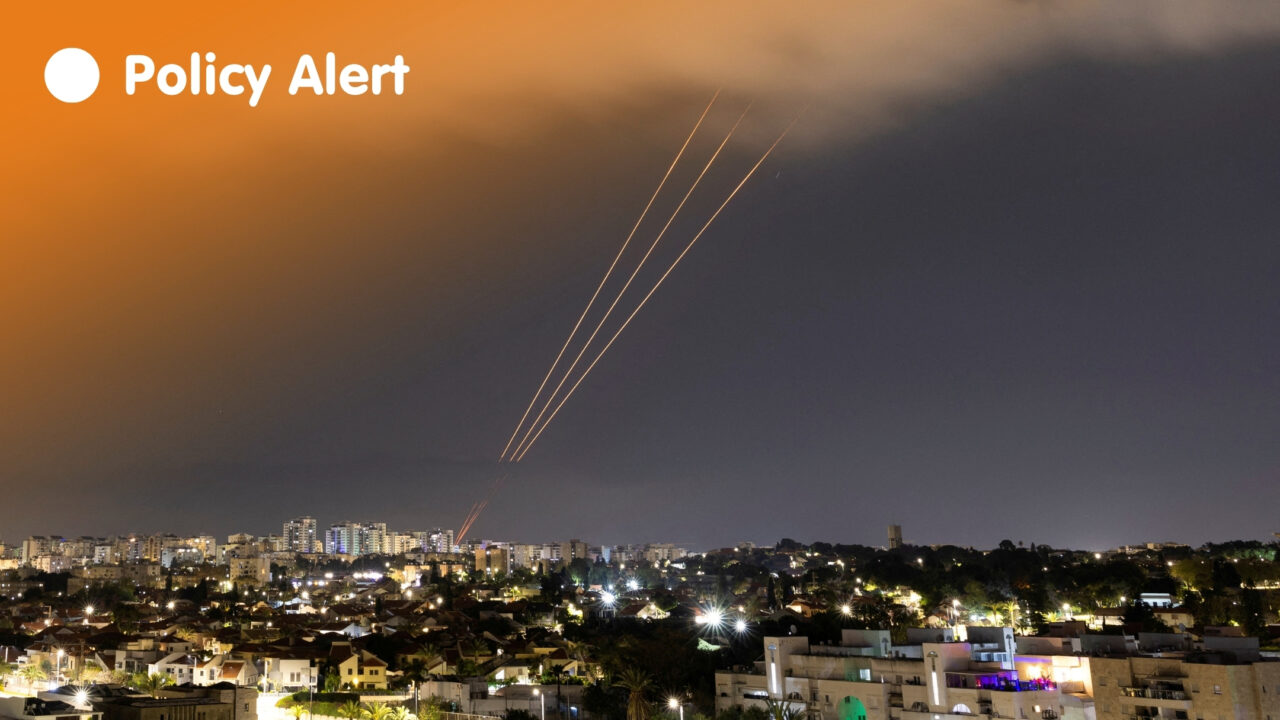Direct destabilisation: Iran’s attack on Israel
Iran’s unprecedented direct attack on Israel risks further escalation in the Middle East. European leaders should join the US in pressing Israel not to retaliate with strikes on Iran – or the region could end up embroiled in an all-consuming war
Overnight on 13 April, Iran launched more than 300 drones and ballistic missiles against Israel. This unprecedented direct attack came in response to Israel’s 1 April bombing of the Iranian consulate in Damascus, Syria, which breached international law and killed seven people – including a senior IRGC general. Israel and its allies say that they intercepted 99 per cent of Iran’s strikes, though at least nine Iranian missiles struck two Israeli air bases. This gravely intensifies the risk of deepening conflict across the Middle East.
What now?
Significant Israeli casualties would have provoked immediate further escalation. But the strikes were well-telegraphed in advance and Iran has made clear (including in a tweet saying it viewed the matter as “concluded”) that it wants to end this escalatory cycle. The trajectory of the situation now depends on whether Israel retaliates, including through direct strikes on Iran. Israeli war cabinet Minister Benny Gantz has already said Israel will respond at a time of its choosing.
Iran claims that it has ushered in a new security equation in which it will respond to future Israeli attacks against its assets or personnel with direct strikes from Iran. But Tehran’s desire to avoid getting sucked into direct conflict may serve to weaken its deterrence posture. The weak showing of the attacks may also strengthen an Israeli perception that Tehran is on the back foot, lacking the willpower and capacity for deeper engagement in a conflict, and that Israel can now inflict a long-desired deeper blow on Iran and its regional proxies.
Israel’s confidence is also likely to be boosted by the international show of support for its position in the face of Iran’s attacks. With Western countries rallying behind the country, and Jordan helping intercept the drones – albeit with the aim of thwarting escalation rather than out of alignment with Israel – global attention has been drawn away from the Gaza crisis. Israel will use this moment to try to refocus global attention on the threat posed by Iran.
The de-escalation imperative
The Iranian attack came in response to a series of escalating Israeli attacks on Iranian personnel and assets since 7 October that culminated in the consulate strike (further explored in ECFR’s Gaza Mapping Project). While Iran’s regional allies have also launched ongoing attacks against Israel over the past six months, Tehran had previously avoided direct engagement. But the consulate attack changed this dynamic, with Iran feeling compelled to respond to maintain the credibility of its eroding deterrence posture.
It would likely be a mistake for Israel, the US, and Europeans to imagine that Iran will not unleash a more intense response to retaliatory strikes on its own territory – which it will view in more existential terms than the consulate attack. Israeli attacks on Iran would risk quickly pushing the Middle East close to all-consuming conflict. US president Joe Biden has thus told Israeli prime minister Benjamin Netanyahu that the US will not support Israel if it launches retaliatory strikes and is pushing him to “take the win”. Europeans should also be striving to prevent more escalation, joining the US in pressing Israel to not retaliate further and then focusing renewed efforts on securing a ceasefire in Gaza – which continues to fuel the wider regional instability.
The European Council on Foreign Relations does not take collective positions. ECFR publications only represent the views of their individual authors.



